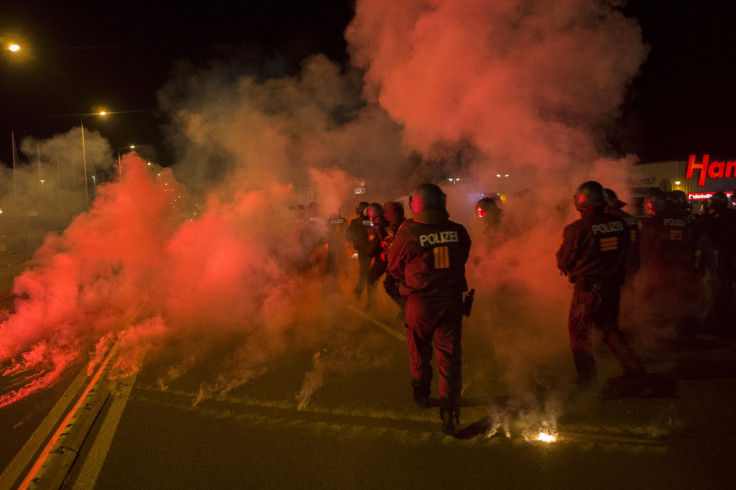Germany: Angela Merkel breaks silence on Heidenau anti-migrant violence as pressure mounts

German Chancellor Angela Merkel has condemned the violent protests against refugees in the eastern town of Heidenau, near Dresden. As the demonstrations continued for a third night, in which 31 police officers were injured, Merkel slammed the "repulsive" actions of far-right extremists.
Police were forced to use tear gas and pepper spray to break the blockade of a former DIY store, which is being used as an asylum seeker shelter. Over the weekend, hundreds of rioters aimed bottles and stones at authorities.
"It is repellent how right-wing extremists and neo-Nazis are trying to spread their gloomy message of hate at a refugee centre. And it is shameful how citizens, even families with children, are supporting this nightmare by coming along [to these demonstrations]," spokesman Steffen Seibert said.
Street violence, arson attacks and media pressure are cranking up the heat on the German leader to act as national newspaper Bild described the events as "the Nazi shame of Heidenau", while another urged her to break her silence. There was no respite for Merkel on Twitter either, with "#merkelschweigt" (Merkel is silent) the top-trending German hashtag.
"And that's what the Chancellor says". Speechless, Mrs. Merkel? #Heidenau #merkelschweigt pic.twitter.com/pR3m5DRHlC
— Laura Schneider (@alauraschneider) August 24, 2015Europe's largest economy is expecting as many as 800,000 people fleeing war and poverty to arrive this year, about four times last year's number according to Bloomberg. In 2015, 626,000 refugee applications were made to EU member states.
Earlier today (24 August), German Vice-Chancellor Sigmar Gabriel visited the shelter in Heidenau and spoke out against the attacks. "We must not concede a millimetre to this mob that spread out over the past days," he said. "You don't belong to us, we don't want you here. When we catch you, we will punish and put you behind bars. This is the only response that these people deserve."
With 107,500 migrants entering the EU last month alone, officials have described the situation as the worst migrant crisis since World War II. A Sunday Mirror investigation published earlier this month revealed that Germany takes 15 times as many migrants as the UK, with 1,000 asylum seekers arriving in the country every day – the majority fleeing from Isis.
Gabriel has warned that EU countries need to make a more concerted effort to evenly distribute refugees among the 28 member states, or risk a breakdown of open borders. According to a BBC report, a recent poll shows that 67% of Germans are "very worried" by attacks on refugee homes, while another survey showed that 93% of people support asylum being granted to those fleeing conflict.
© Copyright IBTimes 2025. All rights reserved.




















